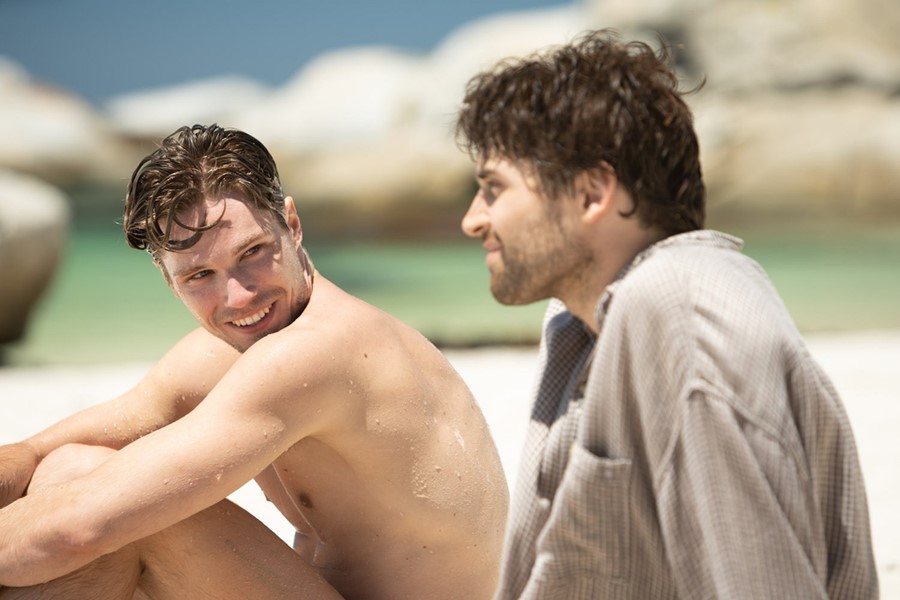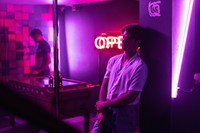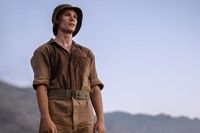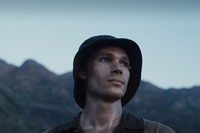Oliver Hermanus’ powerful new feature tells the story of a closeted gay teen in apartheid-era South Africa drafted to fight in the Angolan war. Here, as part of #CultureIsNotCancelled, the filmmaker tells us more
This article is published as part of our #CultureIsNotCancelled campaign:
When producer Jack Sidey flew from the London-based Portobello Productions to South Africa to pitch an adaptation of André Carl van der Merwe’s Moffie to Oliver Hermanus, the filmmaker wasn’t initially convinced. “I wasn’t interested in making a gay love story that ogles young men in military gear,” says the Cannes Queer Palm-winning director. “Honestly, my first reaction was ‘Oh, they want a gay-interest film, set in a military context,’” he says, “and they think I’m the guy to make it because I made a movie called Beauty that was about a repressed gay character living in South Africa.” Their meeting ended, Sidey handed Hermanus a copy of the book, and the director flew to Venice Film Festival to debut his newly finished feature The Endless River.
When he finally did get round to reading Van der Merwe’s autobiographical novel, Hermanus’ feelings shifted. The story itself was a little too safe, too romantic, but the historical backdrop had real cinematic potential. “The army setting, the brutality of it, the propaganda machine that had become the apartheid army by that point – that was much more interesting,” he remembers. From that germ of an idea, Hermanus began to depart dramatically from van der Merwe’s original story. “We got to the point two years later where we’d very much created an entirely different narrative,” he says. The filmmaker retained the essential essence of the book and some of its core themes, but when his actors would ask to see a copy of the novel, to learn more about their characters, Hermanus would say, “none of your characters are in the book!”
Those tweaks, changes and re-writes resulted in a much darker film, one which vibrates with tension. Loosely translated as ‘faggot’ – with all the shame, disgust and contempt that word can embody – Moffie tells the story of Nicholas van der Swart, a closeted gay teen who, along with a trainful of his 19-year old peers, is conscripted to fight in the Angolan war in apartheid-era South Africa. The film spends roughly two years with Nicholas, as he and his fellow recruits are subjected to a battery of abusive, humiliating and physically exhausting ‘training exercises’. Throughout, Nicholas furtively struggles to surpress feelings of same-sex attraction – feelings which, if discovered, would result in his being beaten, committed or worse.
The film’s potency stems largely from its factual foundations. Many of Moffie’s most challenging sequences have been informed by interviews conducted with numerous former soldiers. “We included the things that were most prevalent in people’s memories or experiences,” says Hermanus. In one such example, having just finished an all-night training exercise, a recruit is made to fetch a leaf from a distant tree as punishment for an ear piercing that hasn’t healed quickly enough. “The reply is always the same. ‘It’s the wrong leaf, it’s the wrong leaf,’” says the director. “We heard that story from so many people, either it’d been done to them or they’d seen it being done to somebody else.”
Though he wouldn’t have been conscripted himself – national service was mandated for white South Africans only – Hermanus’ own experiences inform other aspects of the film. Two-thirds of the way through the story, we drift into a childhood flashback – a breathtakingly vivid, single-shot moment which unearths the root of Nicholas’ internalised homophobia. “It’s a piece of writing that comes from my own childhood,” says the director. While holidaying with his family, Hermanus and a friend started campily play-acting in one of the communal bathrooms, making faces in the mirror. Without warning, an older white man who’d overheard them from one of the cubicles, stepped out “slapped at both of us, called us moffies, told us to get out and go to the girls’ bathrooms”. It was a brief, but intensely shameful experience. “I remember walking out of there and all my energy had been sapped. Something had changed, there was a freedom that had been sucked out of us. That moment of innocence had been interrupted. You don’t fully know what you did wrong, you’re confused, but the word lingers.”
The scene is fundamental to our understanding of Nicholas’ central conflict – we’re given a window into his struggles and his shame about his sexuality. “You see where he comes from,” says Hermanus, “you understand him better, his internal trauma, his workings, what he’s suppressing”. More than that, argues the director, it’s a scene that captures the driving force of the film – an experience universally understood by queer people. “Shame is a central theme of the film,” says the director. “Everyone in South Africa has a story with the word ‘moffie,’ everyone remembers the first time they understood the full brunt of it. From that moment you hide, or mask, or create a second version of yourself to avoid being called it again. From then on, you have to negotiate with that shame until you’re ready to take pride in your sexuality and denounce that feeling.”
Moffie streams exclusively on Curzon Home Cinema from April 24, 2020. Its initial theatrical release was cancelled due to the outbreak of Covid-19, though theatrical screenings are still planned to follow at a later date.






